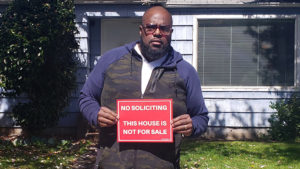
By Aaron Allen
The Seattle Medium
As we continue to see increases in rent and property values, advocates say that we will see an increase in the gentrification of Seattle. The trend, which started in Seattle’s Central District over 25 years ago, has spread to South Seattle and residents claim that developers have been cowering the landscape looking for opportunities to take advantage of minority homeowners in the hopes of landing prime real estate to develop.
If you drive down 23rd Avenue in Seattle you can see significant changes in the both the brick and mortar peppering the landscape of the Central District as well as the changing face of the people who now dwell in those neighborhoods.
While the lure of money and the prospect of buying a new home outside of the area may sound appealing to some, advocates like Chukundi Salisbury, a political hopeful running for State Rep. in the 3th District, which encompasses parts of Central and Southeast Seattle, are encouraging people to keep their homes and not sell them to developers.
Salisbury recently launched a campaign entitled #ThisHouseIsNotForSale” to help people understand and fight back against gentrification through education, action and awareness.
“I’m always talking about gentrification,” says Salisbury. “I have been talking about people engaging and knowing their property values and I have a history of tackling this issue.”
“Before the COVID-19 got on the scene, last year I began this with a campaign called “Don’t Let Your Pride Get You Gentrified” and now we are here with #ThisHouseIsNotForSale,” added Salisbury.
Salisbury says that he launched the campaign to strike back against ruthless developers using the cover of COVID-19 to aggressively and deceptively pressure the area’s residents into selling their homes.
According to Salisbury, the buyers’ tactics have escalated from sending letters of interest to local homeowners to making numerous, harassing phone calls, leaving “friendly” notes on doors, and – most unnerving of all – making “surprise” visits designed to persuade residents into acquiescing to developers’ demands to buy their property.
“Talking to my neighbors, I am noticing that there is an uptick in people coming around wanting to buy your house and we all, who are living in the South Seattle area, are all getting these gift packs asking if we want to sell our homes,” says Salisbury.
“One of the things that sparked me to do this campaign is one of my neighbors has two children and she was getting letters [from developers about buying her home] and she told me that “developers were leaving candy with a notes asking ‘do you want to sell your house,’” trying to appease the mother by offering candy to her children, [now that] is crossing the line,” added Salisbury.
Anita Adams, a long-time resident of the Judkins Park neighborhood, has been a fervent supporter of the #ThisHouseIsNotForSale campaign. As a resident, Adams has been involved as an activist in preserving the cultural integrity of once thriving African American community.
“I was born and raised right here in the Central District of Seattle and my family has endured the redlining that has so deeply plagued this community,” says Adams. “I was excited to learn that activists and advocates like Chukundi Salisbury were putting together an educational campaign that supports the community to learn both about the historical practices and the predatory practices that we are now seeing with respect to the COVID-19 in the Black community.”
Adams believes that this campaign is a great start at educating residents on their rights and the protections they have against predatory developers.
“I think this is a great start,” says Adams. “You want to teach people how to leverage their assets. In my mind, persons like Chukundi are an asset because they are educating, they are bringing knowledge, they are bringing resources by creating an organized approach and I think that is always the best way to approach any scenario.”
Salisbury says the overriding message that he wants developers here is that they need to look elsewhere for opportunities.
“These people need to understand that the Central Area and Southeast Seattle will not stand by and allow itself to be gentrified any further – especially not by the kind of people willing to use a pandemic for a land grab,” he says.



